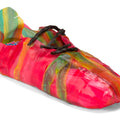
More Buzz about Vibrating (and Parkinsons)
It's happening again, I think.
In the Thomas Industry, David Mantey reports on a new device designed to help Parkinson's patients "walk with greater ease."
What does it do?
It applies vibration your feet.
A few years ago, I reported on a similar device.
So...
Q: What is vibration doing?
A: Stimulating your nervous system, feet first.
Q: Why might you need extra stimulation?
A: Because you aren't letting your feet do one their primary jobs: FEELING (there's a reason you have so many nerve endings in the soles of your feet)
Take a look at this screen grab from the video about the "VibeForward" device:

That's over an inch of padding between you and the ground. And a sole that's stiff enough to prevent your foot from moving naturally.
This is like putting your foot in a cast.
Now here's the fun question:
Q: What else could stimulate the nerves in your feet?
A: USING THEM.
Taking off your shoes so you don't have an an inch of padding between you and the ground. And then, for extra credit, walk on surfaces that, well, stimulate your feet -- grass, sidewalks, trails, gravel, river rocks... you get the idea.
At the very least, put LESS between you and the ground (that's how we design Xero Shoes -- to give you feedback and ground-feel, but still have some protection).
Is this exactly the same as the VibeForward? No, walking barefoot doesn't require batteries, or an app, or use "artificial intelligence."
Q: Will kicking off your kicks and using your feet naturally have the same effect for Parkinson's patients who suffer from freezing gait?
I don't know. But, then again, the data isn't in about the VibeForward yet either.
The Michael J. Fox Foundation gave the University of Delaware $440,000 to study the VibeForward.
Here's my big question:
Q: How can we get the Michael J. Fox Foundation to fund a study on natural movement -- something that's available to everyone NOW?
Got an answer?
The content of this post does not constitute and is not intended to be a substitute for professional medical advice, diagnosis or treatment. Always seek the advice of a physician or other qualified health provider with any questions or concerns you may have about your health or a medical condition.





